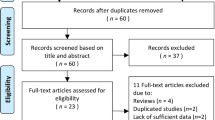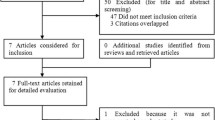Summary
Previous studies suggested an association between the EGF +61 A>G polymorphism and susceptibility to gastric cancer, but the results have been inconsistent. To draw a more precise risk estimation of the association, we performed a meta-analysis of published studies. PubMed, EMBASE, Google Scholar and the Chinese Wanfang databases were systematically searched to identify relevant studies. There were 7 studies involving 1992 cases of gastric cancer and 3202 controls in this meta-analysis. Our study showed that, overall, the EGF +61 A>G polymorphism was significantly associated with the increased risk of gastric cancer in allele model (G vs. A: OR=1.18, 95% CI=1.00–1.39), dominant model (GG + GA vs. AA: OR=1.28, 95% CI=1.05–1.55), homozygous model (GG vs. AA: OR=1.31, 95% CI=1.06–1.63) and heterozygous model (GA vs. AA: OR=1.25, 95% CI=1.01–1.53). The stratified analysis by ethnicity revealed a significant association between EGF +61 A>G polymorphism and gastric cancer risks in Asians. This meta-analysis indicates that EGF +61 A>G polymorphism may increase the risk of gastric cancer, especially in Asians. Large-sized, well-designed studies involving different ethnic groups should be conducted to confirm this association.
Similar content being viewed by others
References
Ferlay J, Soerjomataram I, Dikshit R, et al. Cancer incidence and mortality worldwide: sources, methods and major patterns in GLOBOCAN 2012. Int J Cancer, 2014,136(5):E359–E386
Bornschein J, Malfertheiner P. Helicobacter pylori and gastric cancer. Dig Dis, 2014,32(3):249–264
González CA, Pera G, Agudo A, et al. Smoking and the risk of gastric cancer in the European Prospective Investigation into Cancer and Nutrition (EPIC). Int J Cancer, 2003,107(4):629–634
Duell EJ, Travier N, Lujan-Barroso L, et al. Alcohol consumption and gastric cancer risk in the European Prospective Investigation into Cancer and Nutrition (EPIC) cohort. Am J Clin Nutr, 2011,94(5):1266–1275
Zhu H, Yang X, Zhang C, et al. Red and processed meat intake is associated with higher gastric cancer risk: a meta-analysis of epidemiological observational studies. PLoS One, 2013,8(8): e70955
D’Elia L, Galletti F, Strazzullo P. Dietary salt intake and risk of gastric cancer. Cancer Treat Res, 2014,159:83–95
Saeki N, Ono H, Sakamoto H, et al. Genetic factors related to gastric cancer susceptibility identified using a genome-wide association study. Cancer Sci, 2013,104(1):1–8
Dong LM, Potter JD, White E, et al. Genetic susceptibility to cancer: the role of polymorphisms in candidate genes. JAMA, 2008,299(20):2423–2436
McLean MH, El-Omar EM. Genetics of gastric cancer. Nat Rev Gastroenterol Hepatol, 2014,11(11):664–674
Zeng F, Harris RC. Epidermal growth factor, from gene organization to bedside. Semin Cell Dev Biol, 2014,28:2–11
Laurence DJ, Gusterson BA. The epidermal growth factor. A review of structural and functional relationships in the normal organism and in cancer cells. Tumour Biol, 1990,11(5):229–261
Carpenter G, Cohen S. Epidermal growth factor. J Biol Chem, 1990,265(14):7709–7712
Yamada A, Saito N, Kameoka S, et al. Clinical significance of epidermal growth factor (EGF) expression in gastric cancer. Hepatogastroenterology, 2007,54(76):1049–1052
Costa BM, Ferreira P, Costa S, et al. Association between functional EGF +61 polymorphism and glioma risk. Clin Cancer Res, 2007,13(9):2621–2626
Lin L, Li G, Zhang Z, et al. Association of epidermal growth factor +61 A/G polymorphism in Chinese patients with colon cancer. Genet Test Mol Biomarkers, 2012,16(9):1142–1145
Abu-Dayyeh BK, Yang M, Fuchs BC, et al. A functional polymorphism in the epidermal growth factor gene is associated with risk for hepatocellular carcinoma. Gastroenterology, 2011,141(1):141–149
Hamai Y, Matsumura S, Matsusaki K, et al. A single nucleotide polymorphism in the 5’ untranslated region of the EGF gene is associated with occurrence and malignant progression of gastric cancer. Pathobiology, 2005,72(3):133–138
Araújo AP, Costa BM, Pinto-Correia AL, et al. Association between EGF +61A/G polymorphism and gastric cancer in Caucasians. World J Gastroenterol, 2011,17(4):488–492
Lin X. Wu G, Fu J. The relationship between EGF 61G/A Polymorphisms and gastric cancer risk. Med Front, 2012,(32):231–232
Zhan Z, Chen Y, Wu J, et al. Functional epidermal growth factor gene polymorphisms and risk of gastric cancer. Oncol Lett, 2013, 5(2):631–636
Goto Y, Ando T, Goto H, et al. No association between EGF gene polymorphism and gastric cancer. Cancer Epidemiol Biomarkers Prev, 2005,14(10):2454–2456
Yang G, Rao L, Tian L, et al. An association between EGF and EGFR gene polymorphisms with gastric cancer in a Chinese Han population. Hepatogastroenterology, 2012,59(120):2668–2671
Jin G, Miao R, Deng Y, et al. Variant genotypes and haplotypes of the epidermal growth factor gene promoter are associated with a decreased risk of gastric cancer in a high-risk Chinese population. Cancer Sci, 2007,98(6):864–868
Piao Y, Liu Z, Ding Z, et al. EGF +61A>G polymorphism and gastrointestinal cancer risk: a HuGE review and meta-analysis. Gene, 2013,519(1):26–33
Wang J, Dong W, Guo X, et al. Association between polymorphisms of epidermal growth factor 61 and susceptibility of gastric cancer: A Meta-analysis. Chin J Cancer Prev Treat, 2014,21(2):150–153
Li TF, Ren KW, Liu PF. Meta-analysis of epidermal growth factor polymorphisms and cancer risk: involving 9,779 cases and 15,932 controls. DNA Cell Biol, 2012,31(4):568–574
Zhang YM, Cao C, Liang K. Genetic polymorphism of epidermal growth factor 61A>G and and cancer risk: a meta-analysis. Cancer Epidemiol, 2010,34(2):150–156
Xu W, Li Y, Wang X, et al. Association between EGF promoter polymorphisms and cancer risk: a meta-analysis. Med Oncol, 2010,27(4):1389–1397
Stang A. Critical evaluation of the Newcastle-Ottawa scale for the assessment of the quality of nonrandomized studies in meta-analyses. Eur J Epidemiol, 2010,25(9):603–605
Higgins JP, Thompson SG, Deeks JJ, et al. Measuring inconsistency in meta-analyses. BMJ, 2003,327(7414):557–560
Higgins JP, Thompson SG. Quantifying heterogeneity in a meta-analysis. Stat Med, 2002,21(11):1539–1558
Mantel N, Haenszel W. Statistical aspects of the analysis of data from retrospective studies of disease. J Natl Cancer Inst, 1959,22(4):719–748
Der Simonian R, Laird N. Meta-analysis in clinical trials. Control Clin Trials, 1986,7(3):177–188
Egger M, Davey-Smith G, Schneider M, et al. Bias in meta-analysis detected by a simple, graphical test. BMJ, 1997,315(7109):629–634
Zhang J, Zhan Z, Wu J, et al. Relationship between EGF, TGFA, and EGFR gene polymorphisms and traditional Chinese medicine ZHENG in gastric cancer. Evid Based Complement Alternat Med, 2013,2013:1–13
Cacina C, Arikan S, Duzkoylu Y, et al. Investigation of EGF A61G gene variation and serum EGF level on gastric cancer susceptibility and clinicopathological parameters[ abstract]. FEBS J, 2014,281:75–75
Kobayashi D, Nomoto S, Kodera Y, et al. Suppressor of cytokine signaling 4 detected as a novel gastric cancer suppressor gene using double combination array analysis. World J Surg, 2012,36(2): 362–372
Kang C, Song JJ, Lee J, et al. Epigenetics: an emerging player in gastric cancer. World J Gastroenterol, 2014,20(21):6433–6447
Okuda T, Onda M, Tokunaga A, et al. Stimulatory effect of EGF and inhibitory effect of sialoadenectomy on growth of an EGF receptor-hyperproducinghuman gastric cancer xenograft in nude mice. Surg Today, 1994,24(8):725–733
Yasui W, Takekura N, Kameda T, et al. Effect of epidermal growth factor on rat stomach carcinogenesis induced by N-methyl-N’-nitro-N-nitrosoguanidine. Acta Pathol Jpn, 1990,40(3):165–171
Henson ES, Gibson SB. Surviving cell death through epidermal growth factor (EGF) signal transduction pathways: implications for cancer therapy. Cell Signal, 2006,18 (12):2089–2097
Author information
Authors and Affiliations
Corresponding author
Additional information
The two authors contributed equally to this work.
Rights and permissions
About this article
Cite this article
Wu, Sj., Jiang, Sy., Wu, J. et al. Association between EGF +61 A>G polymorphism and gastric cancer risk: A meta-analysis. J. Huazhong Univ. Sci. Technol. [Med. Sci.] 35, 327–332 (2015). https://doi.org/10.1007/s11596-015-1432-3
Received:
Revised:
Published:
Issue Date:
DOI: https://doi.org/10.1007/s11596-015-1432-3




